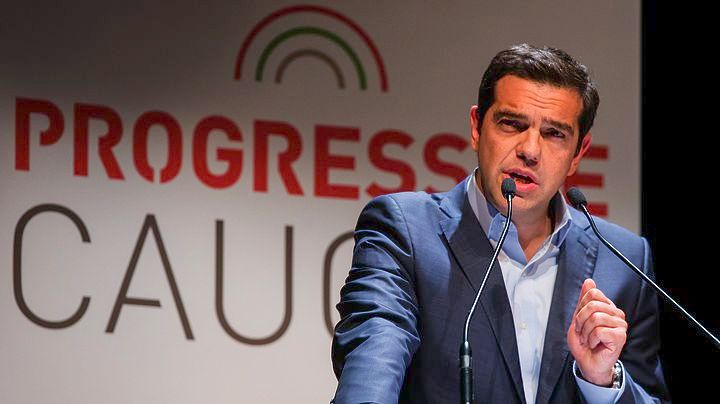Tsipras: Europe cannot improve if it is not progressive

Europe cannot improve if it is not progressive, if it doesn't become social, Prime Minister Alexis Tsipras said on Wednesday, addressing an event titled "The Missing Scenario - An Alternative for Europeans," organised by the Progressive Alliance of Socialists and Democrats, the European Left (GUE/NGL) and the Greens in Brussels.
"Europe cannot be better if it is not social, democratic," he said, noting that the Progressive Alliance is a point of reference for everyone and thanking progressives, socialists and ecologists for the solidarity they have offered to Greece.
"This is why it has a significant political role that far exceeds the simple arithmetic behind the specific political forces that participate in it," he explained.
Commenting on Greece's path, Tsipras said: "Greece has reached the point of return to normality and growth - the point where the exit from the memorandum of austerity is visible. Since January 2015, we defended the sacrifices of the Greek people and particularly, of the poor, the low-income and the unemployed."
He said the government's choice from the beginning was not to risk crushing Greece, not to discredit left-wing ideology in Europe. "We do not embrace austerity policies. We have never stopped implementing a parallel program that protects the most vulnerable."
"We feel vindicated for our choice to stay and fight by creating alliances in the European framework, by negotiating path, by opening windows of hope in the darkness of the European establishment," he said.
Turning his attention to Europe?s future, the premier said the people of Europe need to take their fate into their own hands.
"Europe will take its fate into its own hands only when its peoples take Europe into their own hands," he noted.
The social democrats must face their historic responsibilities and limit the neoliberal consensus. "Europ's heritage is calling for vigilance. Britain's rejection [of the EU] in the framework of euro-skepticism and the rise of the extreme-right are signs of a loss of confidence," he argued, noting it is worth giving this fight together.
The EU, as it is today, "does not inspire and does not attract and inaction means, sooner or later, implosion," he said. ?We need to organize the end of an era for Europe by putting forward a realistic political plan for a Europe ever closer to its citizens by reconnecting European integration to its funding principles"
He recalled a statement made by Chancellor Angela Merkel after a recent G7 meeting, when she said that Europe must take its fate into its own hands.
"But for that to happen, I believe that the fate of European people should be common and that fate cannot be common if a wall of money divides Europe's south from Europe's north. When the economic distance widens and inequalities between European communities grow," he continued. "Europe will take its fate into its own hands when people take their fate into their own hands, when it will concern all its citizens and not some technocrats as it is now."
He said for Europe to become more democratic, the countries should ?at least abandon ideas that are beyond the treaties such as the failed idea of the core Europe because a divided Europe will be a weaker Europe and we should proceed with a social deepening."
The premier also said bodies such as the Eurogroup must work more democratically. "For us, the democratization of the Eurozone means a structure of governance of democratic legitimacy and responsibility, with co-operation for development, with a financial division of responsibilities and an end to social exclusion," he noted.

















































































